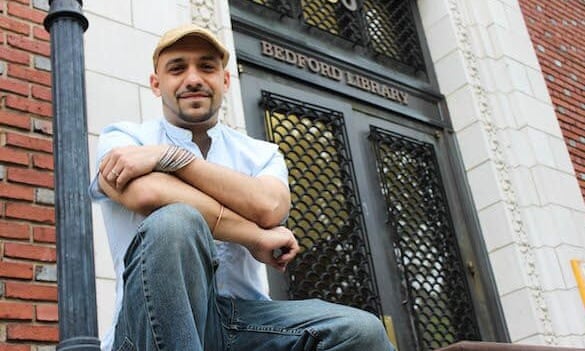It’s fair to say that Daniel José Older is having a very good year.
In the first week of 2015, Penguin published his first novel, Half-Resurrection Blues. By the end of January, Anika Noni Rose’s production company had optioned the film and television rights to the book, as well as rights for the following two in the series. This week sees him publish a hotly anticipated young adult novel called Shadowshaper.
To top it off, he got married in March.
Until 2014, Older worked by day as an emergency medical technician in Manhattan. He wrote mostly at night. And he sees himself, explicitly, as an outsider to the literary and publishing scene: “I entered the writing work clearly and strategically to do this thing, to write these books, to get them into the world and fuck with people, and to generally fuck shit up,” he says at a restaurant in Brooklyn.
Shadowshaper is set in the Bedford-Stuyvesant neighbourhood of Brooklyn, where Older lives. The protagonist, a young Afro-Latina named Sierra, learns about her family’s history of supernatural powers. She can, as it turns out, interact with the spirit world. Her family has gone to great lengths to conceal that fact from her, but now it’s Sierra’s responsibility to protect them from what’s coming.
Older’s imagined Brooklyn is full of danger, less gentrified than the real-life version, and decidedly diverse. “We’re doing something very political by deciding whose life matters, where we’re going to focus things, and who we erase from the picture,” he says. This kind of diversity, he feels, is lacking in most other fantasy YA novels. “When we create worlds based on this world that don’t include diversity, we’re lying,” he says. “We’re not being honest as authors. Even if it’s infused with magical powers, or zombies, or whatever you’ll have, we should still be trying to tell the truth. Then, it becomes a question of what truth, how are we telling it, and whose truth do we take the time to repeat?”
Older is critical of books that he says fail to include racial diversity – such as, he says, The Hunger Games. He chalks it up to a “phenomenal lack of imagination” on the part of the author, and a laziness, he feels, that is designed to keep some people out of the picture. “To be able to figure out all these quirky things about what you imagine the future will be like, and not somehow have any folks of colour doing anything heroic or worthwhile in it, what happened?” he asked. “Where did we go?”

Comments